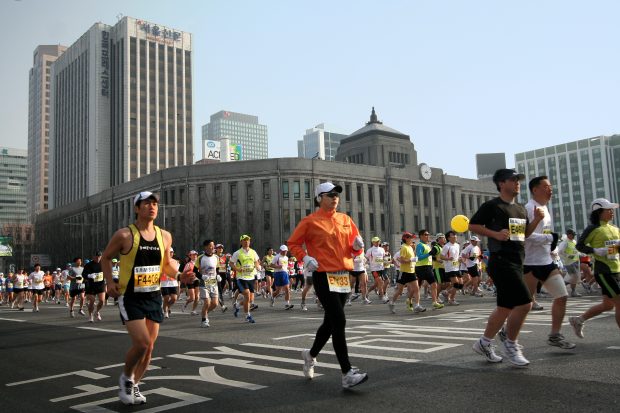Seoul plans marathon at DMZ in Olympics with Pyongyang
Olympic runners and cyclists may be able to compete inside the heavily fortified demilitarized zone (DMZ), according to a working draft of Seoul’s bid to co-host the 2032 Olympics with Pyongyang. The Seoul Metropolitan Government says the DMZ ― a symbol of painful division and the ongoing military standoff between the two Koreas ― is under review as a possible venue for long-distance outdoor events like marathon, cycling and triathlon competitions if it gets to host the games with Pyongyang. “It’s the most symbolic site to deliver a message of peace to the nation and to the world,” said Yoon Joon-byeong, the deputy mayor of Seoul who first pitched the idea. “The untouched natural beauty of the DMZ ― shown through live broadcast ― will also add to the experience.”
Such sports events inside the DMZ, a 4-kilometer-wide, 250-kilometer-long verdant strip dividing the Korean Peninsula, will likely be based at Panmunjeom, the border truce village where the historic inter-Korean summit took place last April. If the logistics don’t work out, future roads connecting the two Koreas across the DMZ may also be a meaningful alternative, Yoon added. Specifics on exactly how to develop parts of the DMZ as a competition venue and ferry athletes across the fortified border are still unclear, especially when considering ongoing international sanctions against the North. But the peace-laden symbolism of an Olympics co-hosted by the divided Koreas is hard to ignore. International Olympic Committee (IOC) President Thomas Bach publicly called the bid “a historic initiative” showing “how sport can once more make a contribution to peace on the Korean Peninsula and the world,” after a two-hour meeting with the joint Korean delegation in Lausanne, Switzerland, Friday.
Seoul said the two capitals can roughly divide up the 33 events according to venue availability on each side. Pyongyang can host 10 sports that North Korea has won medals in or are popular among its citizens, such as basketball, gymnastics and wrestling, while Seoul can host another 18 events on its own. Five events ― including track, swimming, taekwondo and soccer ― can be hosted by both sides. The main stadiums that host the track events will be Jamsil Stadium in Seoul and Kim Il-sung Stadium in Pyongyang, according to the city government. The city says it plans to build the athletes’ village within a 30-kilometer radius of the main stadiums and rent the homes out to the underprivileged or young people at low prices after the games. Seoul says it expects 1 million more foreign visitors to come if it hosts the games with Pyongyang but the costs are worrying. The estimated operation and infrastructure costs for the games are 9.7 trillion won ($8.6 billion) for Seoul and 24. 3 trillion won for Pyongyang, which will have to build most of the facilities from scratch. Last year, the two Koreas showcased a series of sports diplomacy events in the detente, marching under a unified Korea flag at the opening ceremony of the PyeongChang Winter Olympics and fielding a joint women’s ice hockey team. Seoul and Pyongyang announced recently they will send unified teams to the upcoming 2020 Tokyo Olympics in women’s basketball, women’s field hockey, rowing and judo.
By Lee Suh-yoon
(Korea Times)

























































